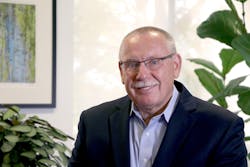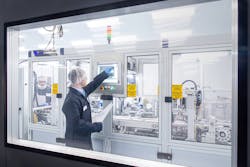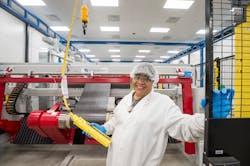March 2020 was the best month ever for Web Industries, an employee-owned manufacturer in the medical and aerospace sectors. “It was our last good month,” lamented CEO Mark Pihl in an interview from his new home base in Chagrin Falls, Ohio, where he and his wife moved to be close to grandchildren.
When COVID-19 hit, Web immediately saw a 50% reduction in its aerospace business. “Who would think that we’d still be in this 130 days later?” he says.
2019 had been a record year for the Marlborough, Massachusetts-based manufacturer of precision composites, which has 800 employees spread out over six U.S. plants, as well as operations in Europe. The company had a completed acquisition in France to write home about, with two new plants, and had doubled the business over six years.
The possibility of layoffs was tough news for Pihl to share—the last layoffs at Web had been 20 years ago—but he shared that possibility early in the pandemic with everyone in the company. And this month Web completed a 20% workforce reduction in its aerospace business, with the help of government subsidized technical unemployment in France and Germany “to minimize the impact,” says Pihl.
There is bright news on the horizon: Web pivoted during the pandemic to expand its medical-test production capabilities, and in the past six weeks has hired and trained 175 new permanent manufacturing employees to ramp up rapid-diagnostic COVID test production to one million units by mid-September, and 2 million by early January.
And Web’s global workforce is generally safe and healthy: Four employees have tested positive for COVID thus far, and average attendance has ranged from 92 to 94% during the pandemic. Daily crisis management meetings with members from operations, executive team, general managers and HR have kept employees informed, along with weekly video updates from Pihl shown on screens posted in work spaces throughout Web’s facilities.
Pihl, a 31-year veteran of Web who has been CEO since January 2019, talked with IndustryWeek about resiliency, reshoring employees stepping up, recruiting in a pandemic and the importance of aligning messaging during a crisis.
Tell me about Web’s transition to COVID test manufacturing.
We started to get a lot of inquiries at our Boston facility, which is our medical device Center of Excellence. We've produced billions of tests. And suddenly we're getting multiple inquiries from market-leading companies around developing and manufacturing COVID-19 test strips.
Now we have our first commercial customer under agreement and are operating under an EUA emergency use authorization from the FDA. These are antigen point-of-care diagnostic tests.What is it taking to pivot your production to COVID tests at a high volume?
First of all, we're starting in a highly manual process, right. We're doing a lot of manual assembly. From 20 weeks since we got the inquiry with this particular customer to start up, we have a fully automated process that can allow us to ramp up production to the million pieces per week. But it requires multidisciplinary teams that are meeting on a daily basis across the globe.
I think the real power of this is that we've taken engineering resources from aerospace and said, “Look, you guys aren't busy. You have experience in automation. Work on the team.” I'll give you one great example. This is this is just fantastic because none of us can fly [right now]. We have a critical piece of production equipment being manufactured being built in Spain, that's going to be delivered within the next four weeks. Well, here's our problem: It’s brand new technology. And we're figuring how do we do the factory acceptance, nobody can fly over. And they're going “Well, maybe you can, we can take videotape,” and we're like, “Nah, this is too critical. This is precision technology. We have to integrate it with other processes in our line.”
We have an aerospace engineer in Germany. He says, “Look, I'll jump in my car and I'll drive to Spain.” That's a long drive. And he did it. He went there and did the factory acceptance. That's just one example of how we pulled together as a team to make things happen.
You’ve not only had to ramp up testing production. You’ve had to recruit 175 new employees for manufacturing operations in the Boston area. How has that gone?
It's been challenging. Because this was a real quick ramp up, we used a third-party resource to go out and survey 23 medical device diagnostics companies in the metro Boston area. We were concerned that our pay and benefits were competitive. Turns out, we were right in line with all the big, big companies. And yet we made a decision to increase our base starting wage by $2 an hour. We're providing sign-on bonuses and other incentives to get people on board. I think there's still a lot of anxiety because of the COVID-19 pandemic. It was a slow process. We’ve met our ramp-up plan, but it’s been challenging.
We have hired and trained 175 manufacturing staff over the past six weeks. We are very close to our original plan, which was very aggressive. Some of our suppliers have been challenged to meet our delivery schedules for equipment and materials, which has caused some delay.
What went into landing the testing contract? Is this something you’re going to continue to do, and will it lead to more business?
First of all, we're one of the largest contract manufacturing organizations in the United States for lateral flow and medical point of care diagnostics. Think about something the size of a pregnancy test. And what you're using is saliva or blood or some other bodily fluid, and you get a rapid test result. That's what we're manufacturing. There just aren't companies of the scale of Web Industries that can produce millions of tests. So that's why we had all these companies coming to us.
We see another opportunity here and it’s that [lack of PPE] has become an issue of national security. I've been talking to legislators and for 30 years or more; we've been offshoring medical devices, medical supplies, pharmaceuticals. For instance, 70% of the PPE is manufactured outside the United States. Look at the crisis we had when this hit. So we see a tremendous opportunity now with this onshoring initiative that the federal government is pushing and saying, look, we need to produce our own products. I think there's tremendous opportunity to build on this not only for COVID-19, but for other tests, like influenza. Those tests today are manufactured in China, or somewhere else in Asia, and we see opportunity to bring all of that back on shore.
Your employees haven’t had to take a lot of bad news in the past. So how have they reacted to recent bad news?
We're employee-owned company. So we can be really transparent. We have an open-book management system. So while the employees don't know what my compensation is, they certainly see the income statements and balance sheets, and they understand cash flow. And they really appreciate the level of transparency and the actions that we've taken to ensure that we save as many jobs as we can. I've been telling them [since early April] that there's going to be a layoff. We just don't know how many people, and what we're trying to do is save every job we can. And what you hear back is, “What can I do to help?”
There's a silver lining in the pandemic. Some new leaders have emerged. I see people demonstrating thought leadership, sharing new ideas. Stepping up and volunteering to take on projects. A willingness to step outside of their comfort zone to do new things.
We've got a print supervisor from our Fort Wayne, Indiana, facility, where we manufacture personal care products. And he had experience with flow wrappers from a prior life. We're installing a new system, and he said, “Look, I can help I know this stuff inside out.” He drove from Fort Wayne with his family, found an apartment. We're paying for the apartment, but he and his wife and two daughters are spending summer in the Boston area to help support the startup of the COVID-19 test.
What has the pandemic taught you about leadership?
The big learning for me is, communicate, communicate, over-communicate. It's Patrick Lencioni, right out of The Advantage. People need to hear it seven times, seven different ways. And I think our people really, really appreciate the fact that I've been transparent and open with them about where the business is at what our challenges are. And when you do that, you find people step up … [You have to say,] “Here's the challenge team. We're going to go through this together. We all have different perspectives and ideas. And we have to we have to really lean on each other to come up with the best solutions.”
Denial is a road to nowhere. It’s critical for leadership to provide a clear vision and direction for what's most important right now, and that there's strong alignment across the company with the crisis management teams.
Have you had any issues with sourcing materials during the pandemic?
We're having some challenges. Particularly in aerospace, there's some real instability in the supply chain. Some of the some of the sub-tier suppliers are really having trouble getting their businesses back up and running again. So that affects the entire extended supply chain. In medical, there’s still a lot of supplies coming in from China. So that's a big challenge.
Have you been able to find alternate sources?
We're developing those suppliers here on shore. I think there's a tremendous opportunity for a resurgence of manufacturing in the United States. This has taught us a very painful lesson. And there's a real initiative underway with medical device and medical supplies, but we don't have enough skilled workers. These are highly automated machines, and we need automation technicians, for example, to troubleshoot these lines.
Web Industries is a clean environment; it's air-conditioned. This is good work that requires skilled workers. It's good-paying, we have a platinum health care plan, and we're struggling to find people. It’s really going to require a partnership between industry, the government and our education system and our educators to gear vocational studies towards manufacturing jobs, and it's just not happening.
So what are you doing to help ensure that you have you now have a pipeline?
We have a couple of good relationships with local community colleges where we've brought people in, that are working on associate degrees and then we'll take them in. They learn our business, they operate machines, they fix machines. We send them back to get their undergraduate degree.
What are your issues right now with sub-tier suppliers?
If the program build rates are down 50% to survive, then you're going to have to have federal help. We were able to take advantage of the CARES act alone to stabilize the business and we had a very strong cash position to begin with, and good banking relationships. Some companies aren't in that position.
Companies that can that can adapt and change quickly are going to succeed. There's tremendous opportunity. So if you look at the French aeronautics recovery plan, which is $17 billion, we've already applied for funding. We've got three projects in development that we want to get funding for.
What's going to happen is the Airbuses and the and the Boeings of the world are going to have to pivot themselves. What they thought was on the drawing board what was on the drawing board, might not work. I think there's going to be a tremendous push in aerospace to go green. Whether it's electrification of aircraft, or hydrogen-powered aircraft. If that was going to be 2035 I think that gets pushed forward.
We’re looking at sustainability in all our products. When you think about the rapid tests, that’s all about miniaturization and reducing costs, using less materials. When you think about the lightweighting of aircraft—we're involved in advanced materials, advanced composites—the problem there is recyclability. We're looking at thermal plastics as a different material that can be recycled.
There's going to be tremendous opportunities in the industry. We just need sources of funding and we need to survive this.
Got a manufacturing candidate for Profiles in Leadership. Contact IndustryWeek leadership reporter Laura Putre.
About the Author

Laura Putre
Senior Editor, IndustryWeek
As senior editor, Laura Putre works with IndustryWeek's editorial contributors and reports on leadership and the automotive industry as they relate to manufacturing. She joined IndustryWeek in 2015 as a staff writer covering workforce issues.
Prior to IndustryWeek, Laura reported on the healthcare industry and covered local news. She was the editor of the Chicago Journal and a staff writer for Cleveland Scene. Her national bylines include The Guardian, Slate, Pacific-Standard and The Root.
Laura was a National Press Foundation fellow in 2022.
Got a story idea? Reach out to Laura at [email protected]


